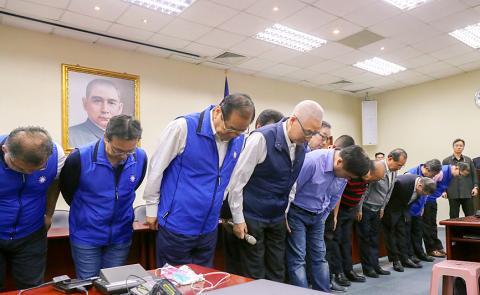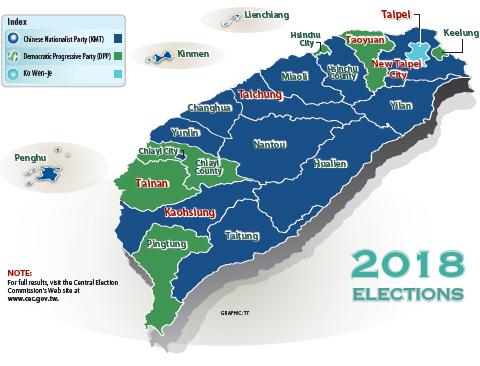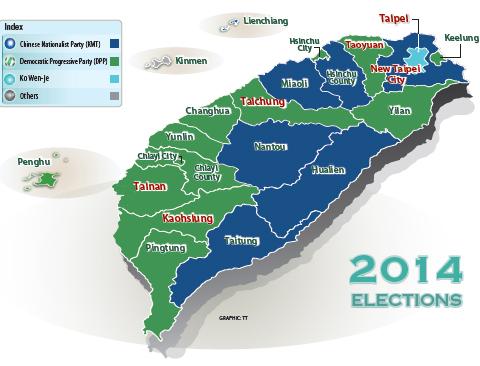The Chinese Nationalist Party’s (KMT) landslide victory in Saturday’s nine-in-one elections appears to owe much to Kaohsiung mayor-elect Han Kuo-yu (韓國瑜), whose meteoric rise gave the party momentum and connected frustrated voters eager to punish the administration of President Tsai Ing-wen (蔡英文).
Prior to the elections, the KMT said that winning 1.5 times the number of cities and counties the party had — six — and flipping Taichung would constitute victory, KMT Culture and Communications Committee deputy director-general Hung Meng-kai (洪孟楷) said.
“The results are definitely beyond our expectations. Not only did we grab Taichung, we also took Kaohsiung, constituting a historic victory,” Hung said, referring to success in mayoral and commissioner elections in 15 out of 22 cities and counties, including three of the six special municipalities.

Photo: CNA
Hung said the effect of the so-called “Han tide” spread to other cities and counties, allowing the party’s candidates to secure victory in elections initially expected to be tight, such as Yunlin County and Taichung.
It also helped narrow the gap between the KMT and the Democratic Progressive Party (DPP) in traditionally pan-green constituencies like Tainan and Pingtung County, he said.
In the 2014, then-Tainan mayor William Lai (賴清德) crushed his KMT rival, then-National University of Tainan president Huang Hsiu-shuang (黃秀霜), by a margin of 447,021 votes. That gap shrank to just 54,644 on Saturday.

Eric Yu (俞振華), an associate research fellow at National Chengchi University’s Election Study Center, also said that Han was a major factor in the KMT’s victory.
He was the glue for different groups of voters who were dissatisfied with the performance of Tsai’s administration, Yu said.
“Rather than thinking that Saturday’s results were because the KMT did a good job in opposition, it is more accurate to say they were due to voters’ overwhelmingly negative perception of the DPP,” Yu said.

Another key factor in the KMT’s wins was the DPP’s adoption of a “value-centered” campaign strategy, despite Tsai winning the 2016 presidential race by painting herself as a pragmatist and centrist, Yu said, citing the ruling party’s tactic of painting a vote for the KMT as a vote against democracy and reform.
The DPP administration’s effort to push for transitional justice was also a factor, as fewer than 5 percent of Taiwanese would list it as a priority in opinion polls, he said, adding that the public clearly places the economy above values.
Han’s call for love and tolerance, and his decision to act on those values by not suing talk show host Cheng Hung-yi (鄭弘儀) over allegedly false accusations against him spoke volumes, National Sun Yat-sen University professor of political science Liao Da-chi (廖達琪) said.
However, the KMT’s overwhelming victory should not be interpreted as voters being fond of the party, as it only reflected growing impatience with unsatisfactory leadership, Liao said.
While its momentum is likely to last until the 2020 presidential election, it is too early for the DPP to give up, Liao said.
“Voters want to see local elections revolve around matters of the economy, not independence or unification, while for presidential races, the focus is more on national sovereignty,” she said.
When asked about the 2020 race, Hung said that the KMT would try to produce a result like Saturday’s, but would keep a cautious attitude.
The KMT could begin its presidential nomination process next year, Hung said, adding, however, that its next goal was to win by-elections to be held within three months to fill vacancies left by five lawmakers who have resigned.

Alain Robert, known as the "French Spider-Man," praised Alex Honnold as exceptionally well-prepared after the US climber completed a free solo ascent of Taipei 101 yesterday. Robert said Honnold's ascent of the 508m-tall skyscraper in just more than one-and-a-half hours without using safety ropes or equipment was a remarkable achievement. "This is my life," he said in an interview conducted in French, adding that he liked the feeling of being "on the edge of danger." The 63-year-old Frenchman climbed Taipei 101 using ropes in December 2004, taking about four hours to reach the top. On a one-to-10 scale of difficulty, Robert said Taipei 101

A preclearance service to facilitate entry for people traveling to select airports in Japan would be available from Thursday next week to Feb. 25 at Taiwan Taoyuan International Airport, Taoyuan International Airport Corp (TIAC) said on Tuesday. The service was first made available to Taiwanese travelers throughout the winter vacation of 2024 and during the Lunar New Year holiday. In addition to flights to the Japanese cities of Hakodate, Asahikawa, Akita, Sendai, Niigata, Okayama, Takamatsu, Kumamoto and Kagoshima, the service would be available to travelers to Kobe and Oita. The service can be accessed by passengers of 15 flight routes operated by

Taiwanese and US defense groups are collaborating to introduce deployable, semi-autonomous manufacturing systems for drones and components in a boost to the nation’s supply chain resilience. Taiwan’s G-Tech Optroelectronics Corp subsidiary GTOC and the US’ Aerkomm Inc on Friday announced an agreement with fellow US-based Firestorm Lab to adopt the latter’s xCell, a technology featuring 3D printers fitted in 6.1m container units. The systems enable aerial platforms and parts to be produced in high volumes from dispersed nodes capable of rapid redeployment, to minimize the risk of enemy strikes and to meet field requirements, they said. Firestorm chief technology officer Ian Muceus said

MORE FALL: An investigation into one of Xi’s key cronies, part of a broader ‘anti-corruption’ drive, indicates that he might have a deep distrust in the military, an expert said China’s latest military purge underscores systemic risks in its shift from collective leadership to sole rule under Chinese President Xi Jinping (習近平), and could disrupt its chain of command and military capabilities, a national security official said yesterday. If decisionmaking within the Chinese Communist Party has become “irrational” under one-man rule, the Taiwan Strait and the regional situation must be approached with extreme caution, given unforeseen risks, they added. The anonymous official made the remarks as China’s Central Military Commission Vice Chairman Zhang Youxia (張又俠) and Joint Staff Department Chief of Staff Liu Zhenli (劉振立) were reportedly being investigated for suspected “serious